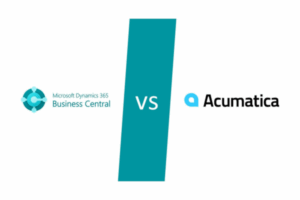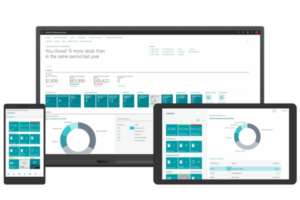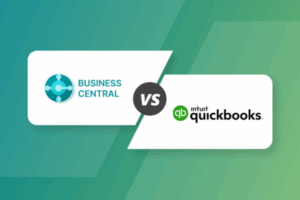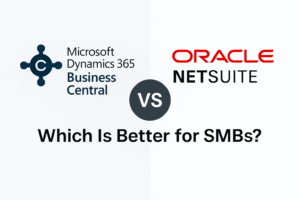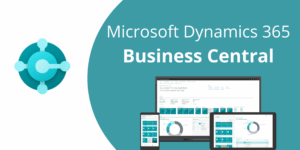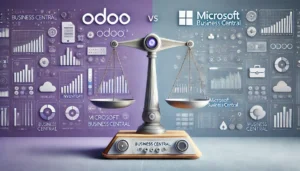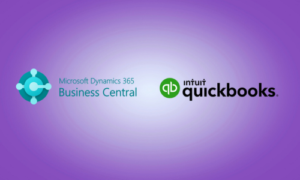What Is SAP Business One?
SAP Business One is an ERP solution designed with smaller businesses in mind. Some people think SAP only caters to really large corporations, but that’s not true. SAP Business One is built to help companies like yours manage accounting, sales, customer relationships, and more all in one place.
Pros of SAP Business One
-
Integration with Other SAP Products
If you’re part of a growing company that might move into more advanced tools down the road, SAP Business One plays well with the broader SAP family of software. -
Strong Inventory and Production Capabilities
Many folks who manufacture physical products like SAP Business One’s ability to handle complex production needs. If you’re a CFO dealing with multiple product lines, this could be a plus. -
Scalability
You can start with fewer features and add more later as your business grows. Think of it like having a Lego set where you can keep building without replacing everything.
Cons of SAP Business One
-
Cost Can Creep Up
The initial cost might look okay, but expenses for add-ons and upgrades can stack up. This sometimes surprises small or mid-sized companies on a tight budget. -
Learning Curve
Some teams feel SAP Business One has a steeper learning curve. If you don’t have an IT expert on staff, it can take longer for employees to adapt. -
Customization Time
It’s flexible, which is cool, but that also means it might require more time to customize. If you have a simple setup, this might not matter, but it’s worth thinking about.
What Is Microsoft Business Central?
Microsoft Business Central is part of the Microsoft Dynamics 365 family. It combines accounting, customer service, sales, and more in a cloud-based system. If you’re already using Office 365 or other Microsoft tools, you might feel right at home here.
Pros of Microsoft Business Central
-
User-Friendly Interface
Since it’s made by Microsoft, it’s designed to feel like the other Windows apps your team already uses. CFOs and CEOs who have employees comfortable with Excel or Outlook might find this a smoother transition. -
Cloud-Based Options
Business Central works in the cloud by default, which means you can access info from anywhere with an internet connection. That’s a big deal if you have remote workers or multiple office locations. -
Easy Integration with Microsoft Products
If you love using Power BI for analytics or Teams for communication, Business Central hooks into these tools with fewer headaches.
Cons of Microsoft Business Central
-
Limited Advanced Features
If you need super specialized manufacturing features, you may need extra modules or third-party apps to fill in the gaps. -
Subscription Costs Can Rise
The monthly or yearly subscription might look cheap at first, but as you add more users or modules, the bill can grow faster than you expect. -
Custom Development Might Be Needed
Depending on how unique your processes are, you might have to hire someone to create custom solutions or integrations. That’s another cost on your spreadsheet.
A Quick Statistical Snapshot
According to a 2021 report by Panorama Consulting, about 50% of businesses said their ERP implementation improved several core processes. However, that same report noted that nearly 40% faced challenges with cost overruns. This tells us that while ERPs can be game-changers, picking the right one and managing the rollout carefully is really important.
If you’re curious how the ERP market is growing, Grand View Research posted a study projecting a big jump in ERP adoption across small and mid-sized businesses in the next few years . That means more companies like yours are investing in these systems, hoping to gain better data insights and more efficient processes.
Real-Life (Fictional) Example: The Busy Online Retailer
Picture a small online retail shop called “Mountain Gizmos” (this is just a made-up company). They started out selling cool hiking gear on eBay and grew to manage their own e-commerce site. Their CFO, Mary, realized the old system of spreadsheets wasn’t cutting it anymore. She needed something to track inventory across different warehouses and manage customer returns all in one place.
-
If Mary Chooses SAP Business One: She might appreciate how SAP handles manufacturing and supply chain details. But she could find herself spending more on customizations if she wants to link it tightly with her website’s software. Over time, she might need to budget for extra training for her team, especially if they aren’t used to the SAP system.
-
If Mary Chooses Microsoft Business Central: She might love that it integrates easily with her Office 365 suite, because her team already uses Excel to crunch numbers. However, if she needs advanced manufacturing features, she could end up spending time and money on extra modules. Still, the user-friendly vibe might save her team some headaches.
Neither choice is bad, but each has its own flavor and cost profile.
When Should You Choose SAP Business One?
You might lean toward SAP Business One if your business is already looking at bigger SAP solutions in the future. Some companies dream of going big, so sticking within the SAP world might be a safe bet. Also, if you need strong production and inventory features right away, SAP Business One can handle that. Just be sure you have the budget for any extra hardware, software, or training.
When Should You Choose Microsoft Business Central?
If you prefer something that “just works” with your existing Microsoft tools, Business Central might feel like a warm blanket. It’s also a great choice if you need a cloud-based ERP that supports remote teams without a bunch of special add-ons. Be aware, though, that if your industry needs very specialized processes, you might have to invest in extensions or custom solutions.
Another Fictional Scenario: The Family-Owned Bakery
Imagine a small but busy bakery called “Grandma’s Secret Dough.” They’ve been growing at a fast pace and just opened a new shop in another town. Their CEO, Patrick, wants to track daily sales, manage employees’ schedules, and make sure they have enough baking supplies without overstocking.
-
If Patrick Picks SAP Business One: He might do it because he plans to expand into online cake deliveries, and he wants a powerful system to manage all those new orders. But he may find the upfront cost a bit high if he only has a handful of employees.
-
If Patrick Picks Microsoft Business Central: He might like the simpler interface and cloud-based approach. This allows his managers to log in from anywhere to check sales numbers. The downside might be that a bakery doesn’t have huge supply chain needs, so some of the more advanced options might feel like overkill.
Key Takeaways
-
Budget and Growth Plans
Before making a choice, think about where your business wants to be in a few years. If you see major expansion, SAP Business One might be worth the investment. If you value easy integration and have a smaller budget, Microsoft Business Central could be simpler. -
Functionality and Integration
Both offer a range of features, but they shine in different areas. Make sure the ERP you pick lines up with what your business actually needs day to day. -
User Adoption
One of the biggest factors is how quickly your team can learn and feel comfortable with the software. A system packed with features won’t help if no one uses it. -
Total Cost of Ownership
Look beyond the sticker price. Monthly or yearly fees, customization costs, and possible third-party integrations add up. Double-check your math before you commit.
Where Alchemy 365 Comes In
We’ve seen the stress that CFOs and CEOs go through when trying to pick the right ERP. That’s why Alchemy 365 is here to answer questions, share insights, and show you real-world examples (even if they’re just hypothetical scenarios). Our hope is to make the decision process a little less confusing. If you ever want to talk about your specific needs, we’re around. Just don’t expect a hard sell—we’re all about helping you find the perfect fit, whether that’s SAP Business One, Microsoft Business Central, or something else entirely.
Final Thoughts
Choosing between SAP Business One and Microsoft Business Central doesn’t have to feel like flipping a coin. When you know each system’s strengths and weaknesses, you can make a decision you’ll feel good about months or even years from now.
If you’re balancing the usual duties of being a CFO or a busy CEO, an ERP can free you up to focus on strategy instead of constantly putting out fires. That’s really the payoff of a good system—less chaos and more clarity.
We hope this guide helped you see the differences between two popular ERPs and gave you ideas on which one might fit your situation best. If you have questions, Alchemy 365 is happy to lend an ear. Think of us as a friendly neighbor who’s been through this before and just wants to share what we’ve learned.
Happy hunting for the perfect ERP. We’re cheering you on every step of the way.






